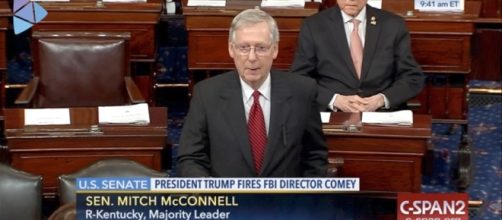Republicans have long relied on Senate Majority Leader Mitch McConnell to give them their "marching orders" on how they should respond to certain issues. Mitch McConnell's message to Republicans in 2010 saying that they would make sure Obama was a one-term president, was one set of marching orders. Last year, he also set the standard for the GOP to agree that they would refuse to hold a hearing for President Obama's Supreme Court nominee Merrick Garland until there was a new president in the Oval Office.
McConnell setting guidelines for GOP response
The Blasting News article linked above mentions the role Republicans played in that obstruction, but does not mention that within hours after reports that Supreme Court Justice Antonin Scalia had died on a Texas ranch, McConnell made a statement on the senate floor to say that they would not hold hearings until the next president, citing "the Biden rule," saying that Democrats had already obstructed in the same way when they were in the majority in the 90's.
After James Comey's firing this week, Mitch McConnell also made a statement Wednesday morning to defend President Trump's decision, calling out Democrats for initially being critical of Comey and siding with Rod Rosenstein during the former FBI director's private letter to Congress about an investigation of Hillary Clinton.
The Senator said that Democrats were being hypocritical to be outraged now. In his statement, he also stood his ground to oppose an independent investigation which Democrats continue to demand over the endless signs that the Trump administration is trying to block the investigations against him.
Republicans adjusting to Trump's guidelines
Republicans have given the appearance that they are conflicted with accepting Trump's agenda. But as a party, they understand that with a "weaponized" president they spent the last eight years creating through their endless obstruction, that such a presidency would at least be able to provide a distraction while they set their agenda. McConnell made this clear within the first few months of Trump's presidency during a press briefing where he said they would continue to aggressively move forward with their agenda.
His only complaint about the President was his attacks on Twitter. Here is a clip from that press briefing.
Recent examples of how Congress have adjusted to their "weaponized" president were the two times Republicans voted on their health care bill, the first time failing due to a traditional response from the House. As the Blasting News article opined -- even though Republicans have been wanting to kill Obamacare for six years, they could not get some in their own party to agree to the final bill. Another example was with a budget proposal where he would take money away from human welfare programs, which Congress initially rejected, but later passed the omnibus spending bill.
McConnell's 'order' to defend Trump's decision
But as another Blasting News article explains in a more recent example, House Republicans were able to pass their American Health Care Act (AHCA) because they used a more Trump-infused approach to get the bill passed no matter what. Ironically, the same Senate that has to deal with that bill are being tested by both the AHCA and their response to the firing of James Comey, via Mitch McConnell.
Even though Mitch McConnell has paved the way for Republicans, there are many in the Senate who are split on where they stand with the decision, saying that the timing of the firing was suspicious. Many of those for Trump's decision have either taken issue with him not indicting Hillary Clinton or that he lost the confidence of the lawmakers and the American people, or that it was time for a fresh outlook. Deputy FBI director Andrew McCabe is currently filling in as interim director while the Justice Department looks for other candidates to take over immediately.


